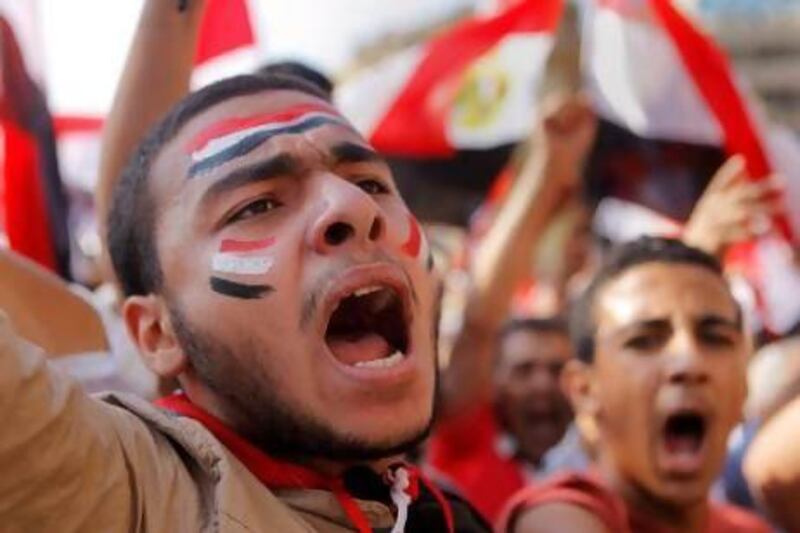CAIRO // Egypt plunged further into chaos yesterday with more high-profile minister resignations and the presidency refusing to yield to protester demands.
With less than a day before a military deadline for feuding political forces to find a solution, there were worrying signs of a stand-off between the military and President Mohammed Morsi, whose office issued a statement criticising the 48-hour ultimatum.
Mr Morsi's office said early on Tuesday morning that it was forging its own plan for national reconciliation and criticised the military for releasing a statement that included "connotations that may cause confusion in the complicated national scene".
Mr Morsi and his prime minister, Hisham Qandil, met the defence minister Gen Abdel Fattah El Sisi yesterday for the second time in as many days.
Gen Al Sisi said on Monday the military would be forced to create its own "road map for the future" if the people's demands were not met. He called the massive demonstrations an "unprecedented" expression of popular will. The army has sent helicopters over Tahrir Square every day since Sunday, some carrying Egyptian flags, drawing cheers from the tens of thousands of protesters gathered there.
The military's plan could involve suspending the new constitution - protesters believe its drafting was dominated by Islamists - and dissolving the upper house of parliament, the only legislative body in Egypt at the moment.
The army said late on Monday that Gen Al Sisi's statement was not meant to be seen as a warning of a coup.
Hossam Sweilam, a retired general with close ties to the military, said a panel of experts would draft a new constitution and the interim administration would be a presidential council led by the Supreme Constitutional Court's chief justice and include the defence minister, representatives of political parties, youth groups, Al Azhar Mosque and the Coptic Church.
There is little doubt that Mr Morsi and his allies are under extraordinary pressure. The streets of Cairo and other cities across the country were again awash with protesters yesterday, many heeding calls from opposition leaders to continue demonstrations until Mr Morsi left office.
Angered by the country's badly deteriorating economy and a widely held perception that the Brotherhood were pulling the strings from behind the scenes to cement control over the country, Egyptians have marched, chanted and protested this week in numbers that many said were higher than during protests against Mubarak in 2011.
At least 16 people have died and hundreds been injured in clashes over the past week.
Adding to the pressure on Mr Morsi has been a spate of resignations over the past two days, including ofhis foreign minister Mohammed Kamel Amr and the ministers of tourism, environment, investment and legal affairs.
The presidential spokesman Ehab Fahmy and cabinet spokesman Alaa Al Hadidi also resigned.
Barack Obama also appeared to retreat from Mr Morsi. In a call from Tanzania, where he is winding up a tour of Africa, he told Egypt's embattled president that "democracy is about more than elections" and that Mr Morsi must ensure "that all Egyptians are heard and represented by their government, including the many Egyptians demonstrating throughout the country".
Ahmed Aboul Gheit, Egypt's former foreign minister from 2004 until the former president Hosni Mubarak's resignation in 2011, said last night that the only option left for Mr Morsi was to resign from power.
"This will end with the removal of the president, one way or another," he said. "His time will not exceed a few days. He has to make the right choice for himself and for the country."
Brotherhood officials have struck back at calls for Mr Morsi to resign, describing them as the product of a conspiracy by remnants of the Mubarak regime. Efforts to unseat the president were against the democratic process, which freely elected Mr Morsi a year ago, they have said.
"Choice is either peaceful democratic transference of power or military-backed coup. Make ur choice #Egypt," the Brotherhood spokesman Gehad El Haddad tweeted yesterday.
Ahmed Shafiq, a former prime minister who lost narrowly to Mr Morsi in last year's election, also said on Monday that the president's reign would end within a week.
"We are going through a stage, which we knew we'd inevitably have to go through," he said. "The failure of the Brotherhood cannot be withstood and has led to catastrophes of all kinds and it was completely expected … I think that this regime will complete within a week and will end its relationship for ever within the region."
Mr Shafiq, a long-time confidant of Mubarak, has been in exile in the UAE for nearly a year to avoid what he has called politically motivated corruption cases filed against him.
Yesterday also witnessed some of the biggest pro-Morsi protests in Cairo, with tens of thousands gathering near Rabaa Adaweya mosque. Many said they would defend the president from efforts to remove him from power, calling him the country's "legitimate" leader.
* Additional reporting by Reuters and the Associated Press
twitter: For breaking news from the Gulf, the Middle East and around the globe follow The National World. Follow us





